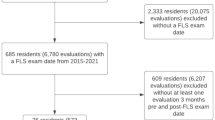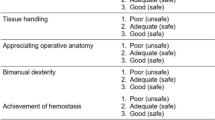Abstract
Background
In preparing for the fundamentals of laparoscopic surgery (FLS) exam, residents usually adopt a self-learning strategy where practice time can be managed with more flexibility. However, with this self-learning strategy, there is a lack of direct supervision from experts and residents risk understudying for this high-stakes exam. Our objective is to determine study goals for effective self-guided practice for the FLS manual skills tasks that will result in passing the examination.
Methods
FLS manual skills data for all PGY-5 residents during 2009–2010 was supplied by the FLS administrative office. Descriptive statistics were performed, and data were regrouped by the pass/fail results of the exam. The minimum practice time requirement for passing each manual skills task is reported in order to guide practice.
Results
1,047 proctored FLS exams were completed by 2009–2010 residents. Mean task time achieved by all residents was 84 ± 31 s for peg transfer, 139 ± 54 s for pattern cut, 78 ± 29 s for endoloop, 158 ± 66 s for extracorporeal suturing, and 168 ± 77 s for intracorporeal suturing. In the pass group (n = 988), mean time to complete each task was 80 s for peg transfer, 134 s for pattern cut, 75 s for endoloop, 148 s for extracorporeal suturing, and 160 s for intracorporeal suturing. Calculations suggest a self-study goal for each task of 53 s for peg transfer, 50 s for pattern cut, 87 s for endoloop, 99 s for extracorporeal suturing, and 96 s for intracorporeal suturing. If a resident can reliably achieve these results during self-study, they have an 84 % chance of passing the exam.
Conclusions
Residents preparing to take the FLS exam can refer to data presented in this study to set practice goals. Referring to these data-based practice goals will help residents to improve their chances of passing this high-stakes exam.
Similar content being viewed by others
References
Okrainec A, Soper NJ, Swanstrom LL, Fried GM (2011) Trends and results of the first 5 years of Fundamentals of Laparoscopic Surgery (FLS) certification testing. Surg Endosc 25(4):1192–8. Epub 2010 Sep 25
Fraser SA, Klassen DR, Feldman LS, Ghitulescu GA, Stanbridge D, Fried GM (2003) Evaluating laparoscopic skills: setting the pass/fail score for the MISTELS system. Surg Endosc 17:964–7. Epub 2003 Mar 28
Fried GM, Feldman LS, Vassiliou MC et al (2004) Proving the value of simulation in laparoscopic surgery. Ann Surg 240:518–525 discussion 525-8
Peters JH, Fried GM, Swanstrom LL et al (2004) Development and validation of a comprehensive program of education and assessment of the basic fundamentals of laparoscopic surgery. Surgery 135:21–27
Mashaud LB, Castellvi AO, Hollett LA, Hogg DC, Tesfay ST, Scott DJ (2010) Two-year skill retention and certification exam performance after fundamentals of laparoscopic skills training and proficiency maintenance. Surgery 148:194–201. Epub 2010 Jul 1
Soper NJ, Fried GM (2008) The fundamentals of laparoscopic surgery: its time has come. Bull Am Coll Surg 93:30–32
Swanstrom LL, Fried GM, Hoffman KI, Soper NJ (2006) Beta test results of a new system assessing competence in laparoscopic surgery. J Am Coll Surg 202:62–69
Scott DJ, Ritter EM, Tesfay ST, Pimentel EA, Nagji A, Fried GM (2008) Certification pass rate of 100 % for fundamentals of laparoscopic surgery skills after proficiency-based training. Surg Endosc 22:1887–1893
Sroka G, Feldman LS, Vassiliou MC, Kaneva PA, Fayez R, Fried GM (2011) Fundamentals of laparoscopic surgery simulator training to proficiency improves laparoscopic performance in the operating room-a randomized controlled trial. Am J Surg 199:115–120
Derevianko AY, Schwaitzberg SD, Tsuda S et al (2009) Malpractice carrier underwrites fundamentals of laparoscopic surgery training and testing: a benchmark for patient safety. Surg Endosc 24:616–623
Nguyen PH, Acker CE, Heniford BT, Stefanidis D (2010) What is the cost associated with the implementation of the FLS program into a general surgery residency? Surgery 24:3216–20. Epub 2010 May 4
Scott DJ, Dunnington GL (2008) The new ACS/APDS Skills Curriculum: moving the learning curve out of the operating room. J Gastrointest Surg 12:213–21. Epub 2007 Oct 10
Parent RJ, Plerhoples TA, Long EE et al (2010) Early, intermediate, and late effects of a surgical skills “boot camp” on an objective structured assessment of technical skills: a randomized controlled study. J Am Coll Surg 210:984–989
Uccelli J, Kahol K, Ashby A, Smith M, Ferrara J (2011) The validity of take-home surgical simulators to enhance resident technical skill proficiency. Am J Surg 201:315–319
Kobayashi SA, Jamshidi R, O’Sullivan P, et al. (2010) Bringing the skills laboratory home: an affordable webcam-based personal trainer for developing laparoscopic skills. J Surg Educ 68:105–9. Epub 2010 Nov 24
Derossis AM, Fried GM, Abrahamowicz M, Sigman HH, Barkun JS, Meakins JL (1998) Development of a model for training and evaluation of laparoscopic skills. Am J Surg 175:482–487
Acknowledgments
The authors would like to thank Carla Bryant and the staff at the FLS administrative office for providing data from the FLS manual skills scoring sheets.
Disclosures
Authors Maria A. Cassera, Bin Zheng, and Lee L. Swanström do not have any conflicts of interest or financial ties to disclose.
Author information
Authors and Affiliations
Corresponding author
Rights and permissions
About this article
Cite this article
Cassera, M.A., Zheng, B. & Swanström, L.L. Data-based self-study guidelines for the fundamentals of laparoscopic surgery examination. Surg Endosc 26, 3426–3429 (2012). https://doi.org/10.1007/s00464-012-2357-6
Received:
Accepted:
Published:
Issue Date:
DOI: https://doi.org/10.1007/s00464-012-2357-6




